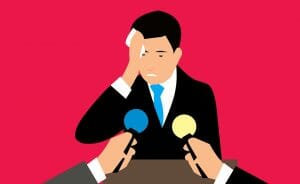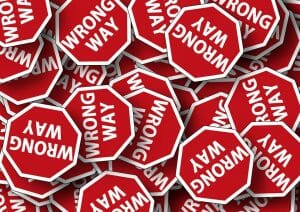La dystopie est une notion liée à l’axe “Fictions and Realities” du nouveau programme d’anglais. Elle peut alors faire l’objet d’un sujet écrit ou oral. Voici une fiche réalisée par Elisa Berdin pour t’aider à comprendre ce thème et l’illustrer avec des exemples concrets.
Definition of dystopia
Dystopia is a fictional genre by which the author depicts an imaginary society ruled by a totalitarian power or an adverse ideology. It is the opposite of utopia: in a utopian novel, we are plunged in a perfect world; in a dystopian novel, we enter a vicious circle we can’t get out from.
These imaginary societies often echo reality. The dystopian author questions our own society, criticises it no doubt and also warns us about the drifts of a situation or an ideology through fiction.
Relevant examples you can use to talk about dystopias
The most famous one: 1984 by George Orwell
In his novel 1984, the British writer depicts a totalitarian society ruled by Big Brother, a stalinian figure and an allegory to the unique political party which holds power. In the streets, propaganda posters read “Big Brother is watching you”. This character, which never appears in person in the novel, embodies the European totalitarian leaders of the XXth century: Stalin in the USSR, Hitler in Nazi Germany or Mussolini in Italy.
The official language in this society is called Newspeak: it is a controlled and simplified language with poor vocabulary which aims at limiting the freedom of thought.
In this novel, Orwell denounces the violation of liberties, the invasion of privacy and the drifts of a totalitarian ideology: people are constantly under surveillance, opponents to the government are arrested… Nowadays, the expression “Big Brother” refers to the practices that invade our privacy or violate our liberties.
On technological drifts: the series Black Mirror by Charlie Brooker
This series imagines a near future and questions the potential consequences of new technologies and their influence on people. The title “Black Mirror” refers to the black screens of our electronic devices which reflect ourselves.
Each episode can serve as an example, provided that you define it precisely (n° and title of the episode, succinct summary and then analysis).
A dystopian movie: Gattaca by Andrew Niccol, 1997
This movie depicts a near future in which science has evolved in such a way that the practice of eugenics is generalised. Eugenics is the study and practice which aims at improving the genes of the human population by selecting the individuals with a ‘superior’ gene heritage and excluding the ‘inferior’ ones.
In the movie, parents can choose the colour of their future baby’s skin or eyes for instance. Particularly, Gattaca is a spatial centre reserved for people with a “perfect” gene heritage.
Gattaca denounces the drifts of reproductive technologies which raises ethical issues such as discrimination. What is the link with our current society? For instance, in the USA, a man named Doctor Steinberg is specialised in “designer babies” and selects embryos to choose the gender of the eye colour of the future child. His actions were criticized but he is still in practice…
How to use these examples during your exam?
Example of a question: “Dystopian fiction is an instruction manual for now”. Do you agree?
Subjects on dystopia often question the frontier between reality (“for now in the example) and fiction. Therefore, you will need to put a stress on the elements which refer to fiction (Newspeak in 1984 for instance). And you will focus on the elements which refer explicitly to something that exists or has existed in the past (Big Brother as the representation of European totalitarian leaders in 1984 for instance) and show how it can raise awareness among readers as citizens/users of technological devices / future parents…
Dystopia : some useful vocabulary
- Dystopie : dystopia
- Dystopique : dystopian
- Totalitarisme : totalitarianism
- Dérive (sens figuré au sens de dérapage) : drift / downward spiral (avec spiral on retrouve l’idée du cercle vicieux)
- Une allégorie : an allegory
- Surveiller : to watch
- Atteinte à la vie privée : invasion of privacy
- Porter atteinte à : to damage sth / to harm sth
- Un appareil électronique : a device
- Être le reflet de qqc : to be the reflection of sth
- Un écran : a screen
- Futur proche : near future
- L’eugénisme : eugenics
- L’éthique : ethics
- Être discriminé : to be discriminated against
S’intéresser à la dystopie te permettra, en plus d’accroître ta culture générale, de te questionner sur la société actuelle et de faire travailler ton esprit critique tout en te divertissant (à noter que la dystopie est également parfois étudiée en cours de français à travers des œuvres telles que Fahrenheit 451 de Ray Bradbury). N’hésite pas, pour travailler ton oral d’anglais, à consulter l’article sur le vocabulaire utile sur le vocabulaire utile à l’oral du bac d’anglais.











